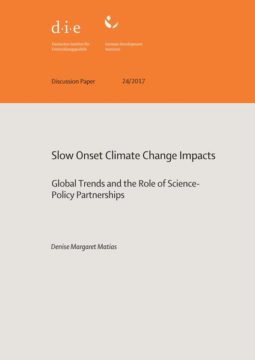Climate change is often associated with extreme rapid onset events such as intense typhoons (also known as hurricanes or cyclones) or heavy precipitation, but it also manifests in slow onset events, such as sea level rise or ocean acidification, whose rate of impact is gradual and appears less destructive than that of extreme events. Yet, the UNFCCC found that the negative impacts of slow onset events are already affecting developing countries and there is an urgent need to manage the risks, despite the slow pace of the process. This discussion paper reviews publications on slow onset events in order to understand how global research is responding to this urgency. By looking at geographical, disciplinary, and thematic trends in research, it concludes that research on slow onset events is increasing. However, most of the currently published research has been conducted in and focused on North America and Europe. With developing countries most at risk, it is recommended that more research efforts be focused on them. In addition, risk-management measures for slow onset events are yet to be established; transdisciplinary cooperation between civil society, researchers, and policymakers can be instrumental in creating an enabling environment for such measures.
- Veröffentlicht am Freitag 13. Dezember 2024 von Deutsches Institut f. Entwicklungspolitik
- ISBN: 9783960210498
- 21 Seiten
- Genre: Gesellschaft, Politik, Sachbücher, Wirtschaft
